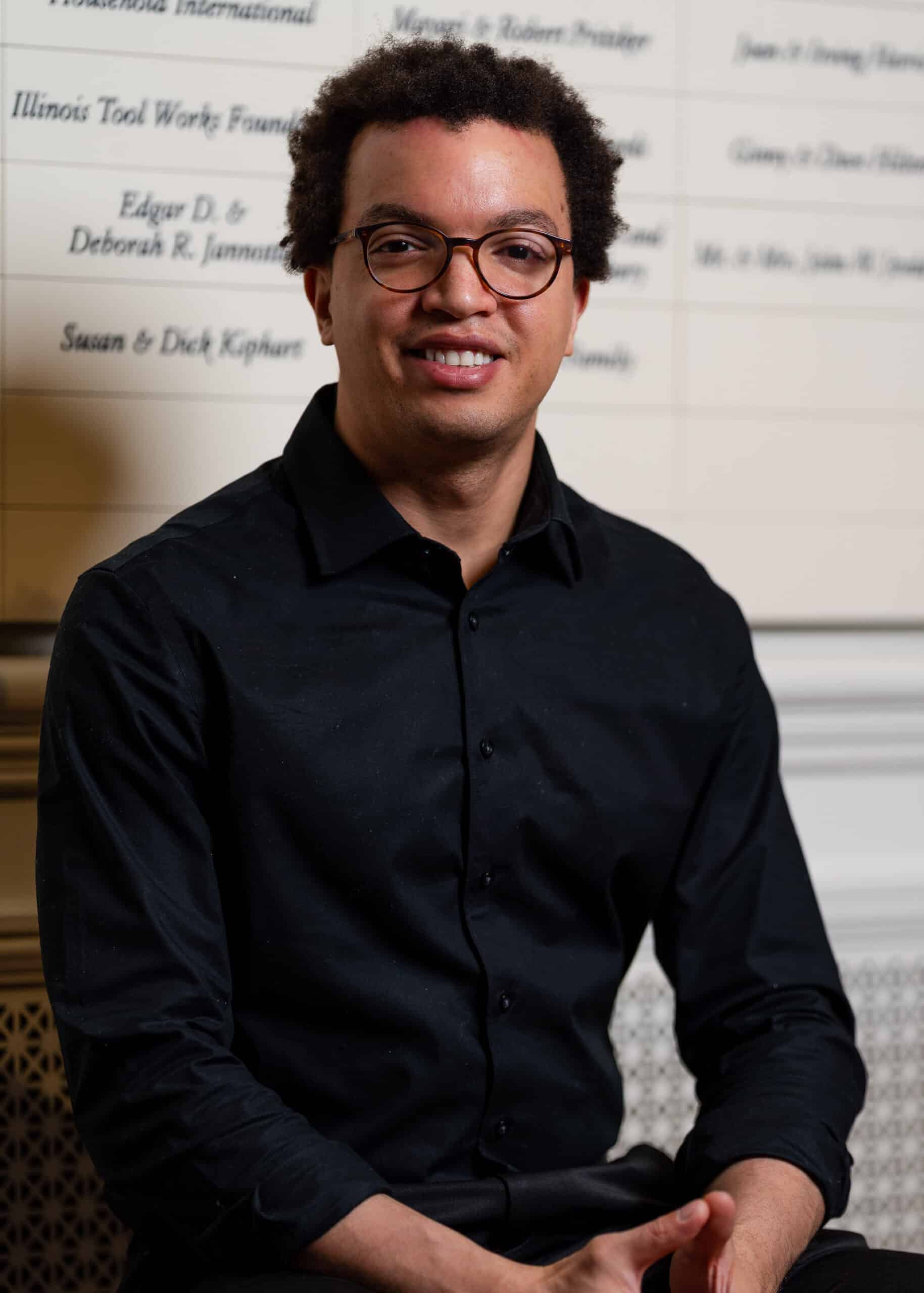James Hall imagined being a part of an innovative program supporting gifted pre-college musicians from underrepresented backgrounds in the Chicagoland area long before the launch of CMPI. While working as Manager of Community Programs at the Chicago Symphony Orchestra Association, James researched the landscape of music organizations that were assisting talented minority youth across the United States and developed a vision for an ideal program. Three years later James was excited to join CMPI, an organization perfectly aligned with his original idea. As a senior project manager James is applying his talents and experience to the work he has been preparing for throughout his professional career — assisting gifted young minority musicians with charting a professional path into careers in classical music performance.
As a young professional double bass player James knows this path well. Growing up in Howard County, Maryland, James was first exposed to classical music performance while in middle school. An orchestra director came by his sixth-grade English class to recruit anyone interested in participating. James considers himself fortunate to have attended a middle school with a comprehensive music program, where instruments, encouragement, and inspiration were provided in abundance. It was through the middle school orchestra that James met his first private teacher, Carolyn Kellock, who instilled in him the high standards of practicing and preparation. In high school James studied with Jason Phillips who continued to mold him, introduced him to theory concepts, and was instrumental in successfully preparing him for college auditions. This led to the completion of multiple professional degrees — a Bachelor’s in Double Bass Performance and a Certificate in Teaching from Peabody Institute of Music, followed by a Master’s Degree in Double Bass Performance from Northwestern University.
As the first musician in the family, James is especially grateful for the mentorship of his teachers who were involved, committed, and generous. There was a time during high school when James worked in a restaurant to earn extra money for lessons. To allow James more practice hours, Mr. Phillips taught him at no charge during busy periods. This and many other individual acts of dedication and kindness allowed James to excel at his studies and formed a concept of mentoring that he is following today with the next generation of young musicians.
Family plays a crucial role in the development of a young musician. James is grateful to have his parents — his father who is a writer, and mother, an English teacher — as partners during the formative years. The biggest help was their ongoing involvement in his music studies. James’s mother attended every lesson and was knowledgeable about his needs and obligations. She was instrumental in guiding him through the challenges of changing teachers, preparing for auditions, selecting college programs, and a myriad of smaller decisions that constantly needed to be made along the way. Today James is glad to see many families coming together to help their talented children navigate the challenging journey of becoming a musician. Their active involvement is one of the most crucial elements in the successful outcome.
Growing up in a family of teachers primed James’s interest in becoming an educator. While in college, he enrolled in the teaching certificate program in parallel with his performance degree. James’s college teachers Rob Kesselman, Paul Johnson, and Peter Lloyd have been excellent role models, as well as Naomi Liang, a public school music educator who taught in the same elementary school her entire career. Shadowing Ms. Liang in the classroom made James aware of teaching as a complex and skillful occupation, with music education presenting a particular set of challenges.
James has been facing and resolving these challenges throughout his professional career, accumulating valuable skills and a wealth of varied experiences along the way. Prior to working at CMPI, James managed community and education projects at the Chicago Symphony Orchestra; conducted a youth string orchestra; taught at the People Music School in the Logan Square neighborhood of Chicago; contributed to the Song for Peace initiative at the Chicago Symphony Orchestra Foundation; and worked as a manager of the Civic Orchestra Fellowship.
Working with youth music programs that lacked the essential resources informed James about the value of family and community support. It also honed his problem-solving skills, which are very helpful in his current role at CMPI. Among the most difficult problems James encountered was the lack of awareness in the community about the value of music education and the effort necessary to succeed. Another challenge was the lack of instruments, which needed to be donated for the students. He also experienced firsthand the triumph of students flourishing and surpassing expectations, including their own, when the resources and support were made available. Such experiences have reinforced James’s dedication to his professional path as a mentor, educator, problem-solver, and a role model to the new generation of young professional musicians.
What makes James most proud about working at CMPI are the success stories. Success can be defined as a large achievement, such as an admission to a prestigious conservatory. Success can also be found in conquering smaller goals: mastering a new technique, finding the motivation to practice leading to an improved performance, or successfully playing on stage for the first time. Being part of these small steps towards a greater goal is a source of tremendous inspiration for James.
James has this advice for the CMPI students, especially when they struggle with making a difficult choice regarding their commitment to musical studies: “If you love music, there is always a place for you. There are opportunities, especially when making music does not feel like work for you. There are many who regret not continuing music studies, regret quitting when hitting a bump in the road. Professional musicians rarely regret becoming one.”
